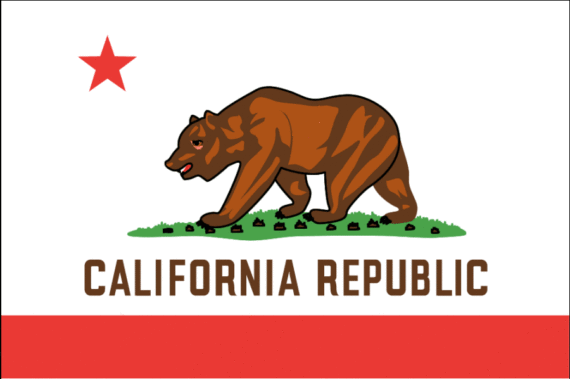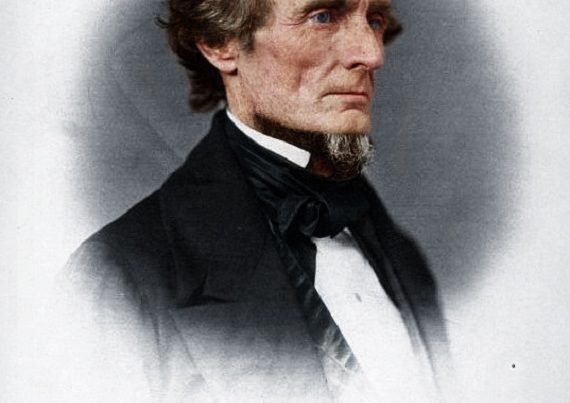It seems that out in California an impressively large number of people are petitioning for a referendum on secession. While I don’t think much of their motive, I say more power to them.
The motivation is, of course, fear by California leftists and foreigners that the 2016 federal election has deprived them of the excessive influence they have exercised over American domestic policies at least since a movie actor was elected President in 1980. The secession move amounts to an adolescent tantrum at not getting their way. This reflects a widespread defect of the Yankee national character—a tendency to reduce public matters to self-centered personal emotions.
However, there is a principle involved here. The basic principle of the Declaration of Independence that Americans claim to admire (though seldom exercising it): just governments must derive their being from “the consent of the governed.” If a majority of the real citizens of California want to be independent of the U.S., they should be and have every right to decide so. Frankly, I would be delighted to be rid of them—far happier, I suspect, than they would be in getting rid of me. I do not need them at all. They need me to boss around and feel superior to.
We are in a new millennium. The ruling classes in the U.S. and Europe have clearly lost their grip—they are ever more selfish, clueless, and incompetent. They cannot think of anything except to keep on doing what they have been doing, no matter how disastrous the results. The 2016 election and other signs indicate that good people everywhere are ready for a new, more democratic and more responsible way of governing.
It is time to think the unthinkable. To rise really to the new challenges of a changing world that politicians are always gassing on about.
These California secessionists are our “discontented fellow citizens,” to use the label that Lincoln placed on Southerners who solemnly and democratically voted to get out from under his rule. Let us hope that if it comes to a real act of secession today, the U.S. government will act more rationally and humanely than it did in 1861. Then the ruling capitalist interests of the Northern States knew that an independent free trade South would critically reduce their profits and deprive them of captive markets and resources. Rivers of blood were preferable. There was a lot of noise about the “glorious eternal Union,” that is, forcible imposition of the false idea that Americans all belong under one government. And a lot of insincere babble about “slavery.”
Doubtless, if Southerners were talking about secession today, the Special Forces and tactical nukes would already be deployed. But Californians are not Southerners and cannot be treated that way. I can’t see that the U.S. has anything to lose and much to gain.
Another unfortunate national defect is to look at nuts and bolts and lose sight of the whole machine. There will be wails about the impracticability of separation of California from the other States. In 1861 there was good faith on only one side–the South was willing to settle all issues of separation responsibly. Where there is good faith on both sides, all issues can be negotiated to a satisfactory settlement. For instance, the U.S. could keep a 99-year lease on its naval bases. Californians entitled to Social Security retirement benefits could keep them, although not all the other welfare from the federal treasury that has made half the people wealthier than the rest of us.
California, as they are saying, is certainly “a country,” as viable in separate nationhood as any other Latin American state. I realize that there are many good Americans in California who do not want to be part of a declining Third World country. The great sums that will be saved from supporting the bottomless welfare state of California can be used to resettle those good people in America if they wish. These folks will be a boon to the U.S. economy and culture.
Imagine the change for the better in reason and patriotism if there were 53 fewer members of the U.S. House of Representatives. (Many of them are loyalists to other countries anyway.) I would recommend putting heavy taxes on importation of Hollywood productions that have destroyed the moral tone of what used to be a reasonably decent people. We might even be able to build a truly American cinema of high quality.
One widespread characteristic defect of the Yankee national character I have mentioned–a tendency to reduce public matters to self-centered personal emotions. There is a socialist side to this that has become glaringly evident of late in California and elsewhere. There is also a fascist side—people who react violently to any notion of breaking up the good ole U.S. of A., “the greatest nation on earth.” This is what happens to people who have no culture and no religion and can only gain identity from their feeling of belonging to a powerful government. Such people are unable to tell the difference between government-worship and real patriotism—the love of one’s land and people. And they are out there, believe me. Every time I write a little something in defense of the Confederacy I receive denunciations as a traitor who will soon meet my just demise.
California independence can bring with it some real problems. For instance, as it collapses ever further into debt-ridden poverty, the government may try to prevent good Americans from leaving, as is the case now with white people in Southern Africa. Parasites need their hosts. Another genuine concern is that the vacuum will bring in dangerous Chinese influence. Response will have to be made to such situations when they arise. Decisions will be much easier without California distorting the national debate.
Some years ago I had a debate with a couple of libertarians who said that they were all for secession where people wanted it, but, of course, it could not apply to the South because the South had immoral reasons for secession and because it was “holding hostages,” the slaves. They displayed the usual ignorant distortion of that portion of American history. After the first wave of secession there were still more slaves in the U.S. than in the seceded States. There were also more free black people in the South than in the North and they were in better condition. To assume that the black people were “hostages” presumes that the North was somehow being deprived of them or concerned about them. That assumption is a grievous lie. If there was one thing that all Northerners agreed upon it was that they did not want the black people, free or slave.
Besides the historical ignorance, there is a more fundamental flaw in their self-righteous philosophizing. If I have a right to secession, then that right cannot be subject to the interference of some force that claims to reject my right on his own self-determined moral considerations. That is simply to say that there is no right and there cannot be and never can be any right. Its exercise will always be countered by some outside evaluation of its bad motives. The South declared honestly that it seceded to be free of exploitation and interference. Its independence could not be justly challenged by an opponent’s propaganda slogan that it was motivated by the evil motive of keeping slavery. In fact, the North had never challenged slavery, only opposed its “extension” to new territory.
I have to confess that my strongest feeling in favour of California secession is the precedent it can set. I dream that someday my own brave and beautiful little country of South Carolina can be independent again, as we have been twice before in our history. We have everything that we need and, from our imprisonment in the Union, a lot that we don’t need. Independence would remove the totally evil influence of the national Republican Party from our polity, and perhaps prompt the flight of a lot of discontented carpetbaggers. (This latter may not work out. I notice that while Yankees always put the South down, they all want to live here if they can.)
A beautiful little warm, coastal Switzerland we could be! Something truly valuable that I can leave my descendants.
There may be those who can love New York or Detroit or Las Vegas. I cannot, but I am willing to live and let live if they will. I certainly cannot love the politicians who govern us all. South Carolina is quite enough for all the genuine patriotism anyone could want.







